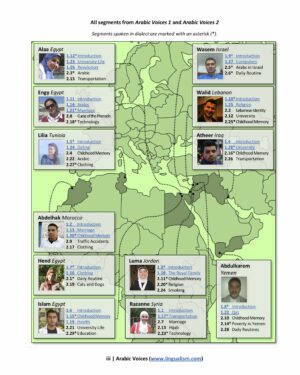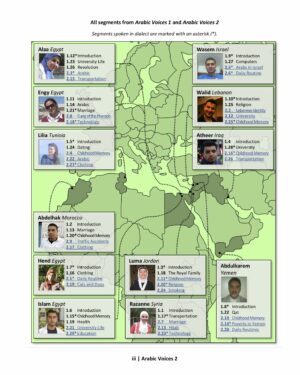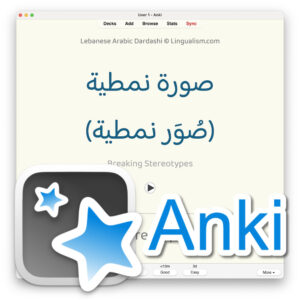Home » Modern Standard Arabic » Computers–Wasem
Computers–Wasem
| Greetings! [00:00] | السلام عليكم ورحمة الله وبركاته. | |
| Hello and welcome to another Arabic Voices video, your way to learning Arabic. [00:03] | أهلًا ومرحبًا بكم في فيديو آخر من فيديوهات Arabic Voices، طريقك لتعلم العربية. | |
| Today we will talk about what Wasem said about the use of computers, and we will comment on what various words and terms he used. [00:10] | اليوم سنتحدّث عمّا قاله وسيم بشأن استخدام الحاسب الآلي، وسنعلّق على ما استخدمه من كلماتٍ ومصطلحاتٍ مختلفة. | |
| Let's get started on page 160. "Computers handle huge amounts of information and can solve complex math problems," Wasem says. [00:21] | فهيّا بنا نبدأ في الصفحة المائة والستون—يقول وسيم: (يتعامل الحاسوب مع كميات ضخمة من المعلومات، كما يتمكن من حل المسائل الرياضية المعقدة). | |
| Here, Wasem, uh, uses the verb يتمكن (is able), and the verb expresses ability. That is, 'to be able to' in the sense of يقدر على. [00:36] | ويستخدم أ... وسيم هنا الفعل [يتمكن] والفعل [يتمكن] بمعنى [القدرة] أي يقدر على، [يتمكن من] بمعنى [يقدر على]. | |
| And when using this verb, you must use the preposition من (from) after it: be able + من + do something, so the computer CAN solve problems. [00:48] | وعند استخدام الفعل [يتمكن] لا بدّ وأن تستخدم حرف [من] بعده، [يتمكن من فعل شيءٍ ما] فالحاسوب يتمكن منحل المسائل. | |
| For example, you could say, "I can manage my time, I can solve problems," and so 'he can do something.' [01:02] | فيمكنك أن تقول مثلًا: (أنا أتمكن من إدارة وقتي، أتمكن من حل المسائل) وهكذا، [تمكن من فعل شيءٍ ما]. | |
| Great! Then we move on to line 4, where Wasem says, “It can absorb thousands of data very quickly, and its accuracy is almost very high). [01:15] | عظيم! بعد ذلك ننتقل إلى السطر الرابع، حيث يقول وسيم: (كما يتمكن من استيعاب آلاف البيانات بسرعة متناهية، ودقة تكاد تكون عالية جدًا). | |
| Wasem here uses the word تكاد, and this word means تقريبًا (almost). You can say, “and the accuracy is تقريبًا (almost) very high," but it is more accurate or better to say تكاد, even though the word تكاد means تقريبًا. [01:28] | يستخدم وسيم هنا كلمة [تكاد]، وكلمة [تكاد] بمعنى [تقريبًا] يمكنك أن تقول: (ودقة تقريبًا تكون عالية جدًا)، ولكن الأدق أو الأفضل أن تقول [تكاد] وإن كان كلمة [تكاد] تعني [تقريبًا]. | |
| The word تكاد is used when... I mean the thing is very close to what you want to tell the person after the word تكاد, so you can say, for example, "He is almost the best in his field. [01:46] | تستخدم كلمة [تكاد] عندما تكون... يعني الشيء مقارب جدًا لما تريد أن تُخبرالشخص به بعد كلمة [تكاد] فيمكنك أن تقول مثلًا (هو يكاد يكون الأفضل في مجاله). | |
| Maybe he is not the only person who is the best, but he is almost the best in his field, almost the best in his field. [02:04] | فربما ليس هو الشخص الوحيد هو الأفضل، ولكن هو يكاد يكون الأفضل في مجاله، تقريبًا هو الأفضل في مجاله، [يكاد يكون، تكاد تكون]، وهكذا. | |
| Great! We then move to line 6, where Wasem says, "The computer has changed the way it was used to perform many tasks and tasks." [02:18] | عظيم! ننتقل بعد ذلك إلى السطر السادس، حيث يقول وسيم: (قام الحاسوب بتغيير الطريقة التي كانت مستعملة في تأدية العديد من الأعمال والمهام). | |
| Wasem here uses the word or verb تأدية, or rather the masdar تأدية, sorry... the masdar تأدية with الأعمال والمهام (works and tasks). [02:31] | ويستخدم وسيم هنا كلمة أو فعل [تأدية] أو المصدر [تأدية] عفوًا... المصدر [تأدية] مع [الأعمال والمهام]. | |
| When we use the word أعمال (works) or the word مهام (tasks) we often use the masdar تأدية or the verb أدى (to perform) with it. [02:43] | وعند استخدام كلمة [أعمال] أو كلمة [مهام] غالبًا ما نستخدم معها المصدر [تأدية] أو الفعل [أدى]. | |
| I say, "I do my duties; I do my business; I also say I do my duties." [02:53] | أقول: (أقوم بتأدية مهامي، أقوم بتأدية أعمالي، كذلك أقول أقوم بتأدية واجباتي) فعند استخدام أعمال، مهام، أو واجبات؛ | |
| When we use works, tasks, or duties, we often use this verb with them. I do my work; I do my duties; I do my homework, and so on. [03:04] | غالبًا ما نستخدم الفعل [يؤدي] معها (أؤدي أعمالي، أؤدي مهامي، أؤدي واجباتي) وهكذا. | |
| We then move to line 9, where Wasem says, "He also helped scientists understand many phenomena, and Wasem says here he helped scientists understand many phenomena. [03:14] | ننتقل بعد ذلك إلى السطر التاسع، حيث يقول وسيم: (كما ساعد العلماء على فهم العديد من الظواهر)، ويقول وسيم هنا ساعد العلماء على فهم العديد من الظواهر. | |
| Here we want to quickly review what we already explained when using the verb ساعد (help) with the preposition على (on): يساعد على (helps to). "... helps me with reading comprehension" and so on. [03:31] | نريد المراجعة هنا سريعًا على ما كنا قد شرحناه من قبل عند استخدام الفعل [ساعد] نستخدم معه حرف الجر [على]، [يساعد على] (هذا يساعدني على فهم القراءة) وهكذا. | |
| And here's a quick review of what we've explained before. [03:45] | وهذه مراجعة سريعة لما كنا قد شرحناه من قبل. | |
| On line 10, Wasem says, “Computers have changed the way in which many areas were performed, such as business... commercial tasks." [03:50] | في السطر العاشر، يقول وسيم: (عملت الحواسيب على تغيير الطريقة التي كانت سائدة في تأدية العديد من المجالات مثل الأعمال الت... التجارية)، | |
| And Wasem uses the word سائدة (dominant) in the sense of منتشرة (prevalent). And the word سائدة means منتشرة. [04:06] | ويستخدم وسيم هنا كلمة [سائدة] بمعنى [منتشرة] كلمة [سائدة] تعني [منتشرة]. | |
| And you can say, “which was dominant in the performance of many fields" or "which was prevalent in the performance of many fields." then the word 'dominant' means the word 'prevalent.' [04:14] | ويمكنك أن تقول: (التي كانت سائدة في تأدية العديد من المجالات) أو (التي كانت منتشرة في تأدية العديد من المجالات)، فكلمة [سائدة] بمعنى كلمة [منتشرة]. | |
| And you could say, "For example, this is a common habit in society; this is a common habit in the community." [04:26] | ويمكنك أن تقول: (هذه مثلًا عادة سائدة في المجتمع، هذه عادة منتشرة في المجتمع). | |
| After that Wasem says... on line 23, Wasem says, "This is to help them in all their needs, and here its importance emerged." [04:34] | بعد ذلك يقول وسيم في السطر الثالث والعشرون يقول وسيم: (وذلك لمساعدتهم في جميع حاجاتهم، وهنا برزت أهميته). | |
| Was... Wasem uses here the word أهمية (importance) with the word برز (emerge). [04:47] | يستخدم وز… وسيم هنا مع كلمة [أهمية] يستخدم مع الفعل [برز]، | |
| And we often use the verb برز with the word أهمية. [04:54] | وغالبًا ما نستخدم الفعل [برز] مع كلمة [أهمية]. | |
| We say, "The importance of something has become a necessity." [04:58] | نقول: (أن أهمية شيء أصبحت من الضرورة) | |
| For example, you could say, “Computers are important in the twenty-first century" or "Technology has emerged in the twenty-first century." The importance has emerged. [05:03] | فيمكنك أن تقول مثلًا: (برزت أهمية الحاسوب في القرن الواحد والعشرين) أو (برزت أهمية التكنولوجيا في القرن الواحد والعشرين)، [برزت أهمية]. | |
| We often use the verb برز with the word أهمية. [05:14] | غالبًا ما نستخدم الفعل [برز] مع كلمة [أهمية]. | |
| Great! We move on to line 28. Wasem says, "It becomes more and more self-controlled, more intelligent; Which makes it easier to use more and more." [05:19] | عظيم! ننتقل بعد ذلك إلى السطر الثامن والعشرون، حيث يقول وسيم: (يصبح مسيطر أكثر فأكثر على نفسه، وأذكى أكثر؛ مما يسهل استخدامه أكثر فأكثر). | |
| We find that Wasem here used the word, or the phrase, أكثر فأكثر (more and more) twice on line 28, as well as on line 29. [05:35] | نجد أن وسيم هنا استخدم كلمة [أكثر فأكثر]، أو عبارة [أكثر فأكثر] مرتين في السطر الثامن والعشرون، وكذلك السطر التاسع والعشرون. | |
| And when using the elative/superlative, then the particle فـ, and then and... the elative again. [05:48] | وعند استخدام [صيغة التفضيل]، بعدها حرف [ الفاء]، وبعدها و... [صيغة التفضيل] مرة أخرى. | |
| This means that something keeps developing, keeps improving. He says, "It's getting more and more controlling." [05:58] | هذا يعني أن شيء يستمر في التطور، يستمر في التحسن؛ هو يقول (يصبح مسيطر أكثر فأكثر). | |
| Or... he also uses it on line 29: "which makes it easier to use more and more." It means that the development is fast and continuous. [06:07] | أو... وكذلك يستخدمها في السطر التاسع والعشرين (مما يسهل استخدامه أكثر فأكثر)، فهذا يعني أن التطور سريع ومستمر، أن التطور سريع ومستمر. | |
| You can say, for example, “It’s getting easier and easier for me to speak Arabic," which means that… there has been a continuous improvement that is getting easier and easier, and a continuous and lasting improvement. [06:19] | يمكنك أن تقول مثلًا: (أصبح تحدّث اللغة العربية بالنسبة لي أسهل فأسهل)، وهذا يعني أن… أنه كان هناك تحسن مستمر أسهل فأسهل، وتحسن مستمر ودائم. | |
| Great! We then move on to line 33, where Wasem says, "So that they may replace humans in doing tasks that humans no longer want to do." [06:39] | عظيم! ننتقل بعد ذلك إلى السطر الثالث والثلاثون، حيث يقول وسيم: (بحيث أنها قد تحل مكان البشر في القيام بمهام لم يعد الإنسان يرغب بالقيام بها). | |
| Here we use the verb يعد in the negative, and we usually use it in the negative, where we say, "nothing happens 'anymore'," and we often use this form of the negation. [06:55] | وهنا يستخدم وسيم الفعل [يعد] في النفي، وغالبًا ما نستخدم [يعد] في [النفي]، حيث نقول: (لم يعد شيء ما يحدث)، وغالبًا ما نستخدم هذه الصيغة في النفي. | |
| For example, we say, "I don't want to do this job anymore. I don't want to... The computer is no longer important to me," and so on. [07:11] | نقول مثلًا: (لم أعد أرغب في القيام بهذه المهمة، لم أعد أرغب... لم يعد الحاسوب بأهمية بالنسبة لي)، وهكذا، | |
| We use يعد with, or in, the negative, meaning that something has changed. [07:25] | فنستخدم [يعد] مع أو في [صيغة النفي]، وهذا يعني أن الأمر قد تغير. | |
| "I no longer want to go to the library," which means that a change has occurred. [07:34] | (لم أعد أرغب في الذهاب إلى المكتبة)، وهذا يعني أن تغيير ما قد حدث. | |
| Then we move on to line 35. Wh... where Wasem says, “Some people think that computers are the result of human laziness to do tasks," and Wasem uses here نتيجة لـ (as a result of), and this phrase means بسبب (because of). [07:43] | بعد ذلك ننتقل إلى السطر الخامس والثلاثون، حي… حيث يقول وسيم: (بعض البشر يعتقدون أن الحاسوب هو نتيجة لكسل الإنسان على القيام بالأعمال)، فيستخدم وسيم هنا [نتيجة لـ]، وهذه العبارة تعني [بسبب]. | |
| "Some people think that the computer is the result of human laziness." That is, it is because of human laziness. [08:07] | (بعض البشر يعتقدون أن الحاسوب هو نتيجة لكسل الانسان) أي هو بسبب كسل الإنسان. | |
| And as you can see نتيجة لـ we use the preposition لـ (of) after the word نتيجة, and after the phrase 'as a result of something' we use the infinitive, as you can see, 'of human laziness..." 'Of human laziness.' "This is the result of the negligence of workers," and so on. [08:17] | وكما ترى [نتيجة لـ] نستخدم حرف [اللام] بعد كلمة [نتيجة]، وبعد عبارة [نتيجةً لشيءٍ ما] نستخدم [المصدر] كما ترى لكسل الإنسان... لكسل الإنسان، (هذا نتيجة لإهمال العمال)، وهكذا. | |
| As a result of' means 'because of.' You can use either to mean the same thing as... You can use this or... this word, or the other word with the same meaning, but remember after النتيجة لـ we use the masdar. [08:37] | [نتيجة لـ] تعني [بسبب]، يمكنك أن تستخدم [نتيجة لـ] أو [بسبب] لتعني نفس الشيء يستر... يمكنك استخدام هذه أو... هذه الكلمة، أو الكلمة الأخرى بمعنّا واحد، ولكن تذكر بعد [النتيجة لـ] نستخدم [المصدر]. | |
| Great! We then move on to line 36, where Wasem says, "although most people disagree." [09:00] | عظيم! ننتقل بعد ذلك إلى السطر السادس والثلاثون، حيث يقول وسيم: (إلى أن معظم الناس لا يوافقون الرأي)، | |
| Here, Wasem wants to negate what he might have said or disagree with what he had said before, and here you can use إلا أن (except that, although). [09:12] | وهنا يريد وسيم نفي ما قد أو الاختلاف مع ما قد قاله من قبل، وهنا يمكنك أن تستخدم [إلا أن]. | |
| When you disagree with something you mentioned before, you can use إلا أن, and here you mean لكن (but). [09:25] | عندما تختلف مع شيء قد ذكرته من قبل، يمكنك أن تستخدم [إلا أن]، وهنا تعني [لكن]. | |
| As you can see here, the word إلا أن means [but]. [09:35] | وكما ترى هنا فكلمة [إلا أن] تعني [لكن]. | |
| You could say, "although most people don't agree with me" or "but most people don't agree with me." So, إلا أن means 'but.' You can use this one or that one to refute something you said before. [09:39] | فيمكنك أن تقول: (إلا أن معظم الناس لا يوافقوني الرأي) أو (لكن معظم الناس لا يوافقوني الرأي)، فـ[إلا أن] تعني بمعنى تعني [لكن]، يمكنك استخدام هذه، أو ذاك؛ للاختلاف مع شيء قد ذكرته من قبل. | |
| And with this, we have finished commenting on what Wasem has said. [10:01] | وبهذا نكون قد انتهينا من التعليق على ما قد قاله وسيم. | |
| I hope you have benefited from this video. [10:07] | أتمنى أن تكونوا قد استفدتم من هذا الفيديو. | |
| Thank you very much. May the peace, mercy and blessings of God be upon you. [10:11] | أشكركم شكرًا جزيلًا، والسلام عليكم ورحمة الله وبركاته. |
Video Lessons
Arabic Voices MSA Lessons
Arabic teacher Mostafa Ahmed takes us through segments in MSA from Lingualism's book Arabic Voices 1: Authentic Listening and Reading Practice in Modern Standard Arabic and Colloquial Dialects, explaining interesting points of grammar and vocabulary.
© 2024 Lingualism LLC










